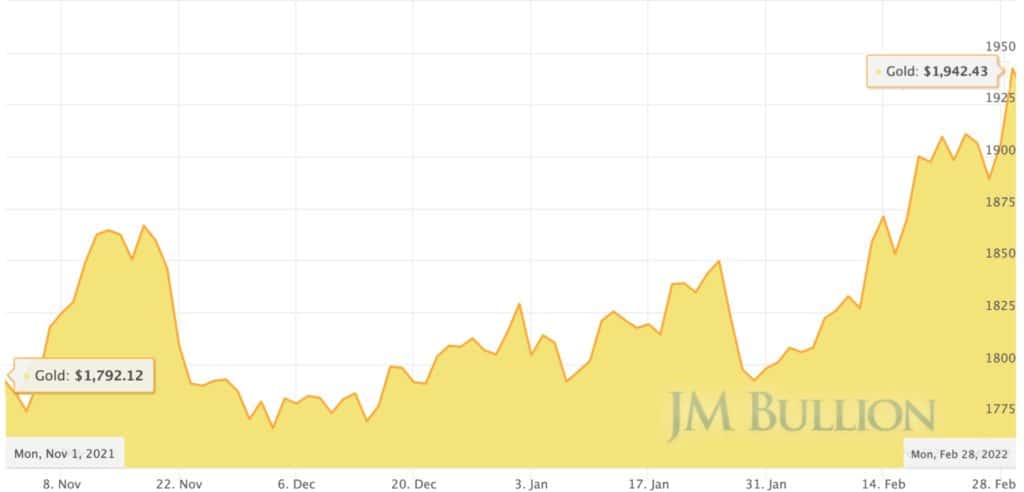Gold has historically been the gold standard (pardon the pun) for hedging against inflation and recessions. Although that has been the perception, a couple of problems with gold do not make it an ideal hedge against inflation or recessions.
These same problems that hinder gold do not apply to commercial real estate (CRE), and it’s why CRE is the new gold (hedge).
PROBLEM #1.
Gold prices are unreliable or stable and can not be relied on to absorb the effects of rising prices. The idea is that as the dollar erodes in buying power due to inflation, the predicted rise in the price of gold should offset inflation. The problem is the price of gold has not always risen in the face of inflation. It has been extremely volatile.
Even in between November of last year and March of this year, even as inflation has reached a 40-year high after a 40-year high, gold has been unstable, as evidenced by the following chart:

Compared to gold price fluctuations, CRE – particularly in the multifamily and industrial segments – have seen rising prices correlated with inflation without the volatility experienced by gold.
Except for the once-in-a-blue-moon event that was the real estate collapse from the mortgage-backed securities debacle in 2008, CRE prices have consistently risen over time without the price volatility of gold. CRE – particularly in certain segments like multifamily – has strongly correlated with rising prices.
So, even as inflation erodes the buying power, investments in CRE and the appreciation from these assets should offset these effects.
PROBLEM #2.
The second problem with gold is it just sits there. We’ve already discussed the first problem with gold being an unreliable preserver of portfolios because of its volatility, but the other problem with gold is it produces nothing. It adds nothing to the coffers. CRE does not have this problem. It produces income and, in some cases, inflation and recession-proof income.
In the past year, even as inflation has reached 40-year highs, multifamily rents have risen accordingly, with vacancies down and rental income up for 2021 – even in the face of the pandemic and inflation.
This recession-resistant income from CRE guards against the loss of income that gold can never provide.
The Fixed Debt Hedge
We’ve talked about the two problems with gold that don’t apply to CRE that makes CRE a better inflation hedge, but CRE holds one additional advantage that’s not often talked about. That advantage is the fixed debt hedge.
CRE is a hedge against inflation because of the ability to lock in interest rates long-term on secured financing that remains low even as everything else gets more expensive, including lending rates.
Even as the underlying value of CRE generally correlates with inflation giving it one hedging element, what truly makes it a hedge is the ability to lock in long-term fixed-rate debt.
For example, when 75% of your capital stack is fixed at say 3-4% and inflation is at 7%, the valuation increase relative to the fixed cost of the debt is what truly makes CRE a hedge. Just buying CRE entirely for cash would not be nearly the hedge that buying it with long-term fixed-rate debt is. This gives CRE an additional advantage over gold as a hedge.
In theory, investors flock to gold to hedge against inflation because the idea is that the price of gold would be expected to rise along with inflation. In practice, this has not been the case.
Gold has demonstrated extreme volatility during times of inflation – even as recent data has suggested. This is due to gold’s liquidity, where it can be traded on the open market without the need of moving physical gold. This volatility makes gold an extremely unreliable hedge against inflation.
CRE does not have the same volatility problem because it’s illiquid – shielding it from herd behavior.
The second problem with gold that CRE doesn’t have is unproductive. Gold does not protect against job loss. CRE does.
Passive income from recession-resistant segments makes CRE ideal to insulate against downturns and loss of income.
If you’re looking for protection in times of inflation and recession, don’t turn to gold. Turn to real estate – the new gold.







